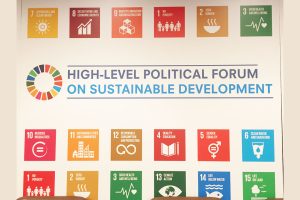12 July 2019: The research network Southern Voice launched six SDG case studies at an event on the sidelines of the 2019 session of the UN High-level Political Forum on Sustainable Development (HLPF). The case studies are part of Southern Voice’s ‘State of the SDGs’ research initiative, and focus on three of the global Goals: SDG 4 (quality education); SDG 7 (affordable and clean energy); and SDG 8 (decent work and economic growth).
The six country case studies explore experiences with implementing these Goals in Bolivia, Ghana, India, Nigeria, Peru and Sri Lanka. The Bolivia case study illustrates the country’s challenges in monitoring education outcomes (SDG 4), and assesses the synergies and trade-offs between access to education and other development progress. For example, gains in school attendance have not contributed to reducing poverty (SDG 1) nor to reducing income inequality (SDG 10). Further, although education returns are almost twice as high for women than for men, women typically earn less than men for all levels of education.
The Ghana case study examines the role of development partnerships in supporting the country’s progress towards clean and affordable energy for all (SDG 7), and underscores how progress in this area can contribute to other SDGs, including SDG 13 (climate action). The case study finds that carbon dioxide (CO2) emissions are projected to increase to 13.3 million metric tons if Ghana’s rural areas continue to use polluting household fuels. The case study also highlights differences in clean energy use between urban and rural areas in Ghana; in rural Ghana, only 6% of households use clean fuels for cooking, compared to 35% of urban households.
The India case study examines the conditions that prevent women from accessing decent and equal employment (SDG 8). It underscores the role of social structures in perpetuating gender discrimination in India. The case study finds that access to education does not shape women’s entry into employment; rather, their participation in the labor market is limited by social norms and safety conditions in public spaces. For example, when a family’s income rises, women are discouraged from working; marriage, motherhood and care responsibilities also restrict women’s access to the labor market.
The Nigeria case study analyzes the impact of conflict and violence on SDG 4, finding that violence causes students and teachers to flee their homes. The case study underscores the difficulties in quantifying education challenges for internally displaced children, nomadic peoples and the disabled, who are often excluded from education and are not included in data.
The Peru case study focuses on education and employment, finding that some groups have benefited less from access to education. As students in Peru advance between grades, female students lag further behind.
The Sri Lanka case study examines the impacts of global adoption of advanced technology on the national labor market, including economic shifts and potential job losses. The case study emphasizes that workers with higher levels of expertise and knowledge are less likely to be replaced by technology than workers with only manual skills.
In a keynote address at the launch event on 12 July 2019, former President of Costa Rica Laura Chinchilla said progress on the SDGs will come “from working with the people and not just for the people.” Southern Voice presented the country case studies for participants’ consideration. The discussion focused on leaving no one behind, synergies and trade-offs, and global systemic concerns in Africa, Asia and Latin America. Southern Voice will reflect the event conclusions in the forthcoming ‘Global Report on the State of the SDGs,’ which will be launched in September 2019 on the sidelines of the SDG Summit.
Southern Voice is a network of more than 50 think tanks from Africa, Asia and Latin America, which serves as an open platform for discussing the 2030 Agenda. [Southern Voice Press Release on Event] [Southern Voice State of the SDGs Webpage] [Bolivia Case Study] [Ghana Case Study] [India Case Study] [Nigeria Case Study] [Peru Case Study] [Sri Lanka Case Study] [SDG Knowledge Hub Sources]

